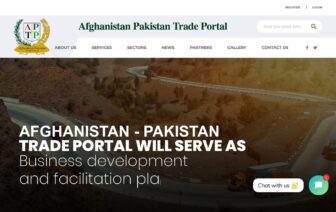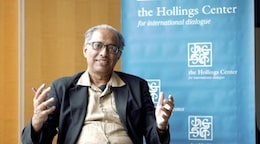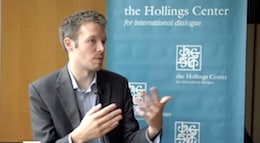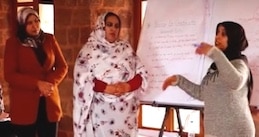Browse Topics
Categories
Format
Multimedia
Speakers Series

Afghanistan-Pakistan Trade Portal
In order to expand mutual peace, prosperity and overcome barriers to trade Hollings Center for International Dialogue grantees from Pakistan and Afghanistan launched an Afghanistan-Pakistan Trade Portal (APTP). The Project aimed at supporting and growing bilateral trade and economic links and between Pakistan and Afghanistan. The trade portal web site can be found at: https://afpaktradeportal.org. […]

Passing of Dr. Mary Ellen Lane
Dr. Mary Ellen Lane, founding board member and former Vice Chair of the Hollings Center for International Dialogue passed away on November 3, 2019 after battling a long illness. The Hollings Center expresses its sincere condolences to Dr. Lane’s family, friends, and colleagues. In addition to her service to the Center, Dr. Lane served as the […]

South Asia Higher Education Symposium: New Regional Approaches
Higher education is often seen as an important investment in dealing with large socioeconomic problems and the key to breaking through barriers to national advancement, economic development, and civil society growth. Home to a quarter of the world’s population, South Asia’s industry and service sectors are growing and creating jobs that require skilled workers. To […]

Planning Megacities
Kazi K. Ashraf discusses how a megacity could be defined and the challenges that definition will create for urbanists in planning for megacities. Kazi K. Ashraf is an architect, urbanist and architectural historian. He received his master’s from MIT and a PhD from the University of Pennsylvania. Currently director-general of Bengal Institute for Architecture, Landscapes […]

Balancing Preservation with Growth in Megacities
Alex Armlovich discusses the issues surrounding growth and preservation in megacities. He outlines good examples of preserving culture, history, and environment, while dealing with the challenges posed by a megacities needs for growth and development. He further outlines the impact of gentrification on megacities. Alex Armlovich is a fellow in state and local policy at […]

Technology and Megacities
Nina Purwajati and Biondo Sanda Sima give examples of how Indonesia and other countries are using technology to address the challenges of megacities. They later discus the urbanization trends in Indonesia and their potential impact. Nini Purwajati is a senior program manager with 100 Resilient Cities – pioneered by the Rockefeller Foundation (100RC) Asia Pacific […]

Food Security in Megacities
Andy Fisher discusses how communities can address food injustice challenges in large scale in megacities. Andy Fisher has been a leading force in the food security and food justice movement in the US for the past 25 years. He co-founded and led the primary American food systems alliance, the Community Food Security Coalition, for 17 […]

Sustainable Development Practices and Food Security in Morocco
In late 2018, the Hollings Center for International Dialogue, in partnership with the High Atlas Foundation and the University of Central Florida, awarded a small grant to Peter Jacques and Yossef Ben-Meir to conduct a project in Morocco to look at the applicability of sustainable development goals in relation to the Amazigh people of the […]

الدمج الاجتماعي عبر ريادة الأعمال
تواجه اليوم منطقة الشرق الأوسط وشمال أفريقيا تحديات كبيرة تتمثل في الدمج الاجتماعيوالتنويع الاقتصادي. وبحسب التقرير الصادر عن منظمة التعاون الاقتصادي والتنمية حول الشباب في منطقة الشرق الأوسط وشمال أفريقيا، "يواجه الشباب في منطقة الشرق الأوسط وشمال أفريقيا، إناثًا وذكورًا، أعلى معدلات البطالة بين الشباب في العالم، علمًا بأن نسبة الشباب (الذين تتراوح أعمارهم بين 15 و29 عامًا) تتخطى الثلاثين في المائة من السكان بسّن العمل في معظم دول المنطقة". كما وتستضيف هذه المنطقة أعدادًا غير مسبوقة من اللاجئين والنازحين داخليًا، إذ أفادت المفوضية السامية للأمم المتحدة لشؤون اللاجئين أن هذه المنطقة كانت تضم في العام 2017 ستة في المائة من سكان العالم إنما نحو ربع اللاجئين والعائدين وعديمي الجنسية والنازحين داخليًا وطالبي اللجوء. وهؤلاء اللاجئون يتواجدون في العديد من الدول المتوسطة الدخل من الشريحتين الدنيا والعليا كلبنان وتركيا والأردن. ويؤدي التحدي المزدوج المتمثل بالحاجة إلى التنويع الاقتصادي والتعامل مع المجموعات السكانية المهمشة إلى تضارب الاحتياجات. فالدول مضطرة للتعامل مع قرارات تتعلق بتوفير إمكانية النفاذ إلى سوق العمل والبرامج الاجتماعية للاجئين في الوقت نفسه الذي يتعين عليها تلبية احتياجات مواطنيها الذين ربما يعانون هم أيضًا من البطالة وصعوبة الاستفادة من الفرص.

Girişimcilik yoluyla Sosyal Entegrasyon
Günümüzde Orta Doğu ve Kuzey Afrika (MENA) bölgesi çok ciddi sosyal entegrasyon ve ekonomik çeşitlilik sorunlarıyla karşı karşıya. Ekonomik İşbirliği ve Kalkınma Örgütü’nün MENA bölgesindeki gençler üzerine hazırladığı bir rapora göre “MENA bölgesindeki genç kadın ve erkekler, dünyanın en yüksek genç işsizlik oranının olduğu bölgede yaşıyorlar. Birçok ülkede, gençlerin (15-29 yaş arası) çalışma çağındaki nüfus […]
A non-profit, non-governmental organization dedicated to fostering dialogue between the United States and countries with predominantly Muslim populations in the Middle East, North Africa, South Asia, Eurasia and Europe
Stay Informed
Subscribe to our mailing list to stay up to date on our latest information.